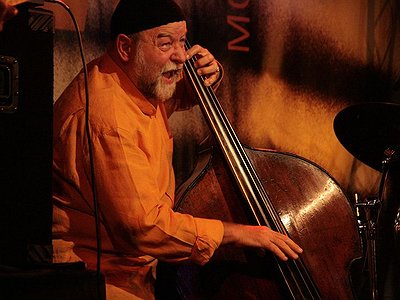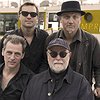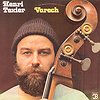Opening doors
He might, Henri Tuxier once suggested, have saved some time had he been born a few decades later. When Texier started out as a double bass player on the French jazz scene in the 60s, being self-taught was not an exception, but the rule; compositions were at best fragmentarily scribbled down into notebooks; and when he discussed melodic ideas with his creative partner Don Cherry, all melodies were transcribed from the piano to the bass by ear. Compare that to the formalised structures of today, with jazz students taking obligatory courses in music theory at university. Then again, he might have missed out on one of the most exciting times of recent musical history. Texier performed with some of the genre greats, set up the influential and celebrated Transatlantic Quintet and eventually turned into a key figures of European jazz in his own right: His bass is warm and bendy, elegant yet determined, equally capable of laying down hypnotic funk patterns and exploring the realms of timbre. Even thirty years after his solo debut Amir, his new record At l'Improviste sounds as determined and fresh as ever. The passion to transcend what's already been achieved, the constant search – they've never left him.
When did you start playing your instrument, and what or who were your early passions or influences?
I started to play the acoustic bass at the age of 16. At 14, I was playing piano and my two first jazz heroes were Sydney Béchet and Thelonious Monk. When I started to play the bass, Miles, Coltrane and Julian Adderley were my heroes, my first bass player was Charles Mingus, but I preferred him more as a band leader than as a bass player ... Then Wilbur Ware with Sonny Rollins and Elvin Jones at The Village Vangard, Sam Jones with Cannonball and Paul Chambers, but inside the rythm section with Philly Joe Jones, were my great influences … And my passion became All Jazz Music.
What do you personally consider to be the incisive moments in your artistic work and/or career?
There were a lot of incisive moments in my career!
At the very beginning, playing with Bud Powell, Kenny Clarke, Lee Konitz, specially with Dexter Gordon and Art Taylor!
Then Don Cherry with Aldo Romano, Gato Barbieri and Karl Berger …
Phil Woods and his "European Rythm Machine" with Daniel Humair, G. Gruntz and then Gordon Beck …
And then with all the groups I was putting together with great soloists as Joe Lovano, John Scofield, John Abercrombie, Bill Frisell, Steve Swallow, Paul Motian, Bob Brookmeyer, Dewey Redman, Aldo Romano, Louis Sclavis, Kenny Wheeler, Miroslav Vitous, etc…
Writing music for cinema (Bertrand Tavernier), theatre and for many different art forms …
Keith Rowe once asserted that it is often certain people that “give one permission to do things”. How was that for you – in which way did the work of particular artists before you “allow” you to take decisions which were vital for your creative development?
It wasn't so much that anybody allowed me to take decisions, but some great artists did give me some keys to open the doors of artistic spaces. One of them was Don Cherry, then came Michel Portal and many others …
What are currently your main artistic challenges?
My main challenge is to try to create a space in the listener's head and allow him to fill that space as he wishes with his own imagination.
What do improvisation and composition mean to you and what, to you, are their respective merits?
Impro and compo are for me the same parts of the same creative process.
I love and need everything giving me the possibility to be creative. Everything is possible and I don't want to make any choice between impro and compo … It really depends on your inspiration.
How important are practising and instrumental technique for achieving your musical goals?
Instrumental practise is a required to make the "machine" (your own body) capable of effectively expressing your feelings … With this in mind, every one must find his own way of practising, always taking into consideration the music he is hearing in his head.
How do you see the relationship between sound, space and performance?
Any artist on stage or in a playing situation in general is dependent on sound and space. Most of the time, because of the "magic" of jazz music, jazz musicians are playing in "strange" spaces and they can suffer a lot. We need a real space, a real sound, a real musical acoustic. We need to hear each other because we are inventing our own music simultaneously with our companions.







